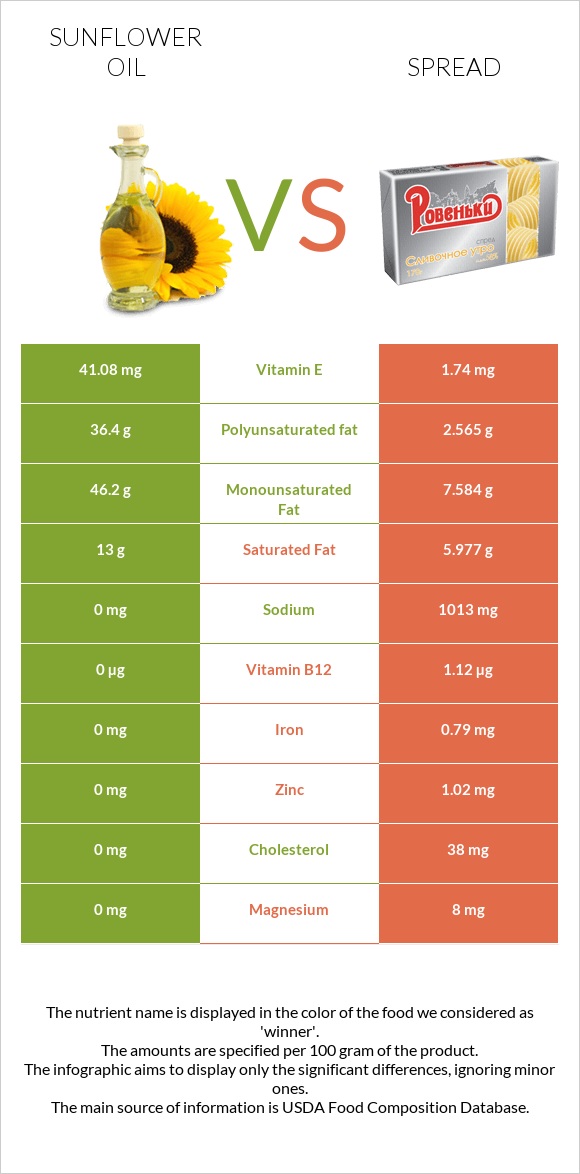Sunflower oil vs. Spread — In-Depth Nutrition Comparison
Compare
Significant differences between sunflower oil and spread
- Sunflower oil has more vitamin E, monounsaturated fat, and polyunsaturated fat; however, spread is richer in vitamin A and vitamin K.
- Sunflower oil covers your daily vitamin E needs 263% more than spread.
- Spread has 9 times less polyunsaturated fat than sunflower oil. Sunflower oil has 36.4g of polyunsaturated fat, while spread has 3.98g.
- Spread contains less saturated fat.
Specific food types used in this comparison are Oil, sunflower, linoleic, (partially hydrogenated) and Margarine-like spread, SMART BEAT Super Light without saturated fat.
Infographic

Infographic link
Mineral Comparison
Mineral comparison score is based on the number of minerals by which one or the other food is richer. The "coverage" charts below show how much of the daily needs can be covered by 300 grams of the food.
| Contains less SodiumSodium | -100% |
| Contains more PotassiumPotassium | +∞% |
Vitamin Comparison
Vitamin comparison score is based on the number of vitamins by which one or the other food is richer. The "coverage" charts below show how much of the daily needs can be covered by 300 grams of the food.
| Contains more Vitamin EVitamin E | +2316.5% |
| Contains more Vitamin KVitamin K | +127.8% |
All nutrients comparison - raw data values
| Nutrient |  |
 |
DV% diff. |
| Vitamin E | 41.08mg | 1.7mg | 263% |
| Polyunsaturated fat | 36.4g | 3.98g | 216% |
| Fats | 100g | 17.1g | 128% |
| Monounsaturated fat | 46.2g | 7.6g | 97% |
| Saturated fat | 13g | 2.22g | 49% |
| Calories | 884kcal | 158kcal | 36% |
| Sodium | 0mg | 755mg | 33% |
| Vitamin K | 5.4µg | 12.3µg | 6% |
| Potassium | 0mg | 12mg | 0% |
| Trans fat | 2.45g | N/A |
Macronutrient Comparison
Macronutrient breakdown side-by-side comparison
Protein:
0 g
Fats:
100 g
Carbs:
0 g
Water:
0 g
Other:
0 g
Protein:
0 g
Fats:
17.1 g
Carbs:
0 g
Water:
80.83 g
Other:
2.07 g
| Contains more FatsFats | +484.8% |
| Contains more WaterWater | +∞% |
| Contains more OtherOther | +∞% |
~equal in
Protein
~0g
~equal in
Carbs
~0g
Fat Type Comparison
Fat type breakdown side-by-side comparison
Saturated fat:
Sat. Fat
13 g
Monounsaturated fat:
Mono. Fat
46.2 g
Polyunsaturated fat:
Poly. Fat
36.4 g
Saturated fat:
Sat. Fat
2.22 g
Monounsaturated fat:
Mono. Fat
7.6 g
Polyunsaturated fat:
Poly. Fat
3.98 g
| Contains more Mono. FatMonounsaturated fat | +507.9% |
| Contains more Poly. FatPolyunsaturated fat | +814.6% |
| Contains less Sat. FatSaturated fat | -82.9% |



